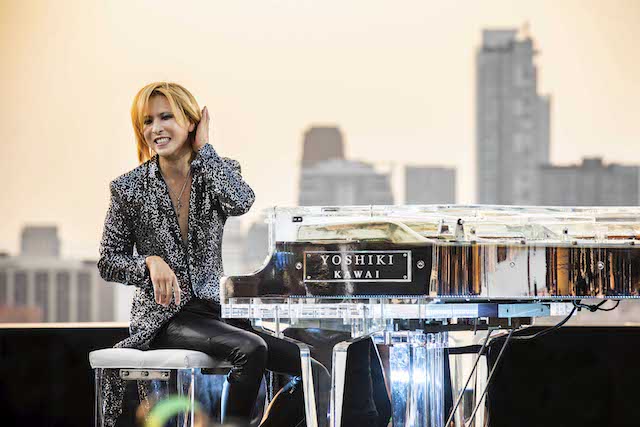
Synopsis : YOSHIKI: UNDER THE SKY features the world-renowned rock star and composer leading a global concert featuring today’s top musical artists. Directed by YOSHIKI – leader of rock bands X Japan and The Last Rockstars – the project was conceived during the recent period when artists could not connect with their fans. YOSHIKI has gathered an unprecedented collection of artists for a deeply emotional journey, including a heartbreaking interaction with the husband of a terminally ill fan and a celebration of voices joined from across international borders. With powerful live performances by The Chainsmokers (USA), St. Vincent (USA), Sarah Brightman (England), Scorpions (Germany), HYDE (Japan), SUGIZO (Japan), SixTONES (Japan), Jane Zhang (China), Lindsey Stirling (USA), Nicole Scherzinger (USA), and more, YOSHIKI: UNDER THE SKY demonstrates the power of music and YOSHIKI’s message to the world that we can overcome any difficulties together.
- September 5, 2023
- Yoshiki
- Sid Gains, Mark Ritchie, Doug Kluthe, Aaron Latham-James
- Yoshiki
- A List Media Entertainment
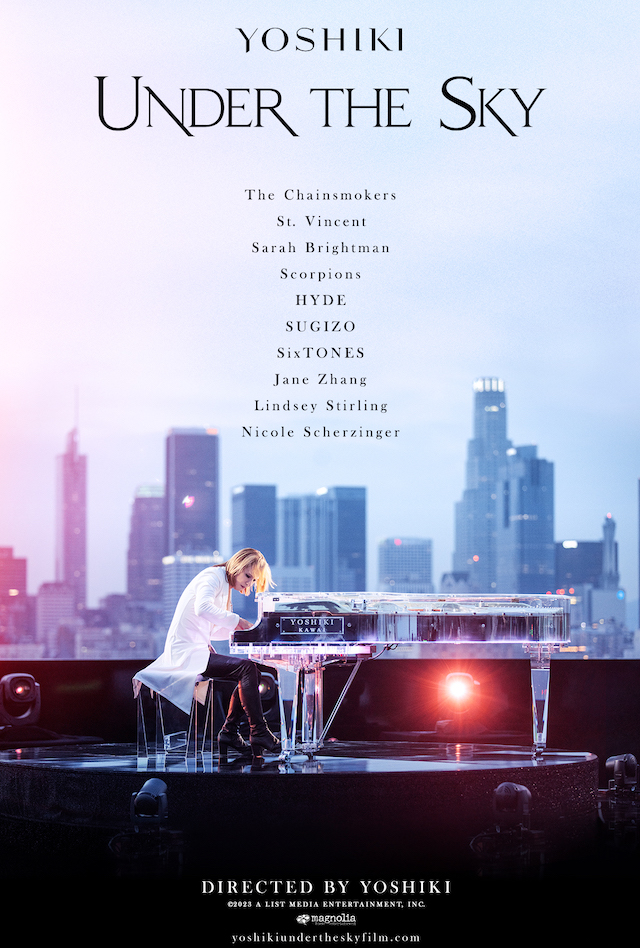
Exclusive Interview with Musician/Director/Producer Yoshiki
Q: Having worked with Darren Lynn Bousman on the film “Repo! The Genetic Opera” and Stephen Kijak on “We are X,” what was your vision in working on this film — your directorial debut?
Yoshiki: Actually, I wasn’t so much conscious of directing the film as I was more conscious of the fact that I had to make this film no matter what. In the second half of the film, when the end roll was coming up, I thought, “Come to think of it, who is the director of this film?” But soon, I was told by everyone, “You have been directing this since the beginning,” so I became the director.
Q: Stephen Kijak, who worked with you on “We are X,” was involved as a consulting producer on this film. Through your work with him and Darren Lynn Bousman (on the film “Repo! Genetic Opera”) what filming techniques did you learn that were incorporated into this film?
Yoshiki: Not only with them, but I’ve been involved in the production process of other films as well and have gained a lot of knowledge from them. This time, they were involved in an advisory capacity, but I don’t feel like I am doing anything special in this film. Rather, I was doing what I needed to learn, and then, became something of a director [Laughs].
Q: Yoshiki-san, you’ve overcome many obstacles as a rock musician. This time, in your pursuit of expression as an artist, you’ve teamed up with Sarah Brightman, the world-renowned American opera singer who performed in “Phantom of the Opera” and did the theme song for the Japanese national soccer team; The Chainsmokers, who sang the song “Closer;” plus HYDE and SixTONES from Japan. Are there other musicians from various genres that you want to work with? What criteria did you use to select these musicians?
Yoshiki: Basically, I’m in the category of a rock musician, although I also play classical music. I wanted to select artists who are not bound by one genre [like me] and who are edgy among the genres, so the initial list was longer. I want to collaborate with such edgy artists and also those who are very close to me.
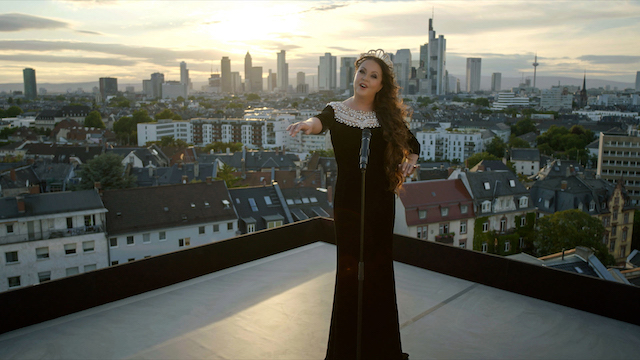
@Yoshiki : Under the Sky, Sarah Brightman
Q: On your classical world tour “Yoshiki Classical 10th Anniversary World Tour with Orchestra 2023 – Requiem”— particularly at the New York concert — you talked about your relationship with your mother, who is a special person especially after your father’s untimely death. What words did she share with you about the music you make?
Yoshiki: I’ve been composing music since I was a child. When I visited my mother at home, she showed me a score that I had written, a “symphony” of sorts, at about age 10. I guess my mother must have believed in me in her own way, because I had shown her such things as a child and she kept them.
Q: Does this mean that you want to make music that would not only satisfy yourself, but, somewhat, for your mother?
Yoshiki: Yes, when we (X Japan) packed the Tokyo Dome or something like that, she was just like, “Oh, yeah,” but when I performed “Anniversary,” a song celebrating the 10th accession to the throne of Their Majesties, the Emperor and Empress, my mother said, “Wow, that’s great,” which was pretty normal in my household. It was a normal parent-child relationship, not so much one between the artist and mother. She often asked me, “Are you eating normally?” or “Did you sleep okay last night?” And that kind of thing [Laughs].
Q: In the film, there’s a scene where you’re composing a score without using any instruments. Of course, the way you create the score depends on the music you are involved with. But what kind of things usually inspire you to write the score?
Yoshiki: I write music scores like a diary. Sometimes I write them quickly before going to bed. I write them on airplanes, and get inspired by instruments if I have them. Before my last performance at Carnegie Hall in New York, I played the piano, but this time I was only in New York for one day, so I thought it was no use having a piano. I arrived in New York from Germany last night and went to practice the piano. If I had an instrument, I would have played the piano, but basically, it’s better to write music in notation first so that there are no limits [As far as creation] goes, I can play any instrument and later adjust it.
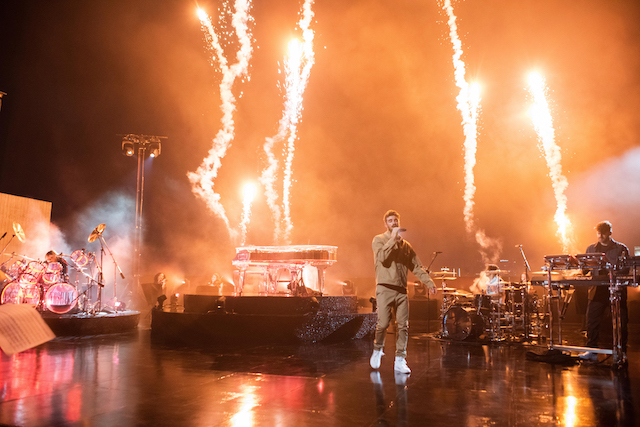
@Yoshiki : Under the Sky, The Chainsmokers
Q: After watching this, it seems you have been influenced by films quite a lot. What kind of films have you watched and how have they influenced you?
Yoshiki: Although I watch action movies sometimes, I also like movies that reflect the human heart, such as “A Beautiful Mind” and ”Braveheart.” I once had dinner with Francis Ford Coppola; I also like his “film, “The Godfather.”
Q: This time, you’ve been involved in the world tour. But there has been sad news in your life such as the death of a member of X Japan; there are still many X Japan fans around the world who want to see the band in the future. What’s your guiding principle of X Japan in the future?
Yoshiki There’s been a lot of hardships in being in the band X Japan. To be honest, I don’t know how long I have left to live. I don’t think I would have much time to live if I continue to live like this [which is very workaholic]. I think I have two versions of myself: one is Yoshiki as a leader of X Japan, the other is Yoshiki as a solo artist, and if you include Yoshiki as a human being, there are about three versions of Yoshiki [laughs].
I’m always a bit confused, and I really work almost 24 hours a day, all week long, 365 days a year, so that, in itself, is an honor, and I feel very honored to be able to do this, not only with music, but also with a movie like this — with passion.
I am living my life thinking that I shouldn’t be weak, but there are many things that make me feel bad. This morning, I cried alone, and my tears were falling. I thought that I don’t want to live like this, so there are many other things that make me feel bad.
But I want my fans to be happy, so I want to do as much as I can. It’s not easy and I’m trying my best to clear up various problems. I am sorry that I can only say a few half-hearted words to the fans. At any rate, I am trying my best to make everyone happy.
Q: You are with the Williams Morris Agency (WMA) in the U.S. In Japan, there was the issue of the sexual assault by Johnny Kitagawa, founder of Johnny & Associates. In other countries, talent doesn’t join a company like a Japanese entertainment agency, but rather has an agent who handles their work. What do you think is the ideal form for Japanese entertainment agencies to take when handling young artists who go abroad in the future? You also support young Japanese artists.
Yoshiki: Well, I don’t think there’s a right answer to this question. I am very familiar with it because I am also in Hollywood. It’s simply because there is a conflict of interest, so an agent can’t be an agent at a Japanese entertainment agency. In essence, agents have tour booking, or branding responsibilities, etc., but I am in a position where I have to negotiate leading the team as well as being the artist. That would be a conflict of interest. In the U.S., it’s forbidden to do so. In Japan, there’s not such a barrier and sometimes a separate manager will get the job done for me.
I basically work through an agent, but there are many possible patterns. I think the easiest structure to understand in the U.S. is that the artist becomes the CEO of the company and hires a manager or an agent.
In Japan, management is the mainstay, which is not necessarily a bad thing, and I think it can be a good thing. So, I don’t think it is a good idea to bring Hollywood’s standards to Japan. I have been under contract with an American agent for a long time now, and I work almost exclusively within the American system,
But when I am in Japan, I sometimes follow the way of Japanese entertainment agencies. But, I think it would be better if one or more of us could set a precedent for Japanese entertainment agencies in the U.S. I think it will become the standard. It’s not a case of just bringing Hollywood standards. If one or more Japanese entertainment agencies set a standard in the U.S. once, it will become the standard. That is the way to compete. So, I don’t think that the system in Japan is bad.
Q: Yoshiki-san, you devote your beliefs to your music. Where does the driving force come from that keeps you from losing it?
Yoshiki: Actually, I lose it almost every day [Laughs]. But with the support of my fans, it’s like I’m walking on a tightrope, and when I’m about to fall, the fans send me a wind or something and cheer me on, saying, “Hang in there, hang in there!” I’m just barely making it but I’m just getting by. I don’t have that much mental leeway [Laughs].
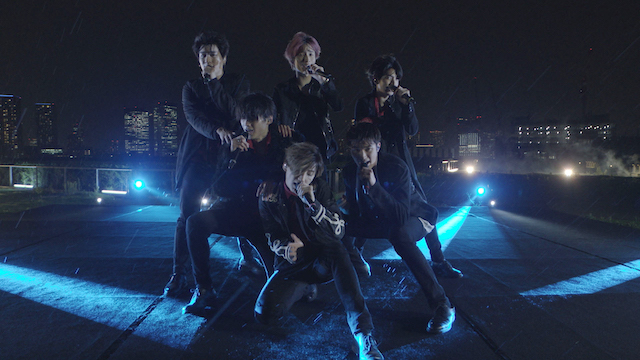
@ Yoshiki : Under the Sky, SixTONES
Check out more of Nobuhiro’s articles.
Here’s the trailer of the film.

